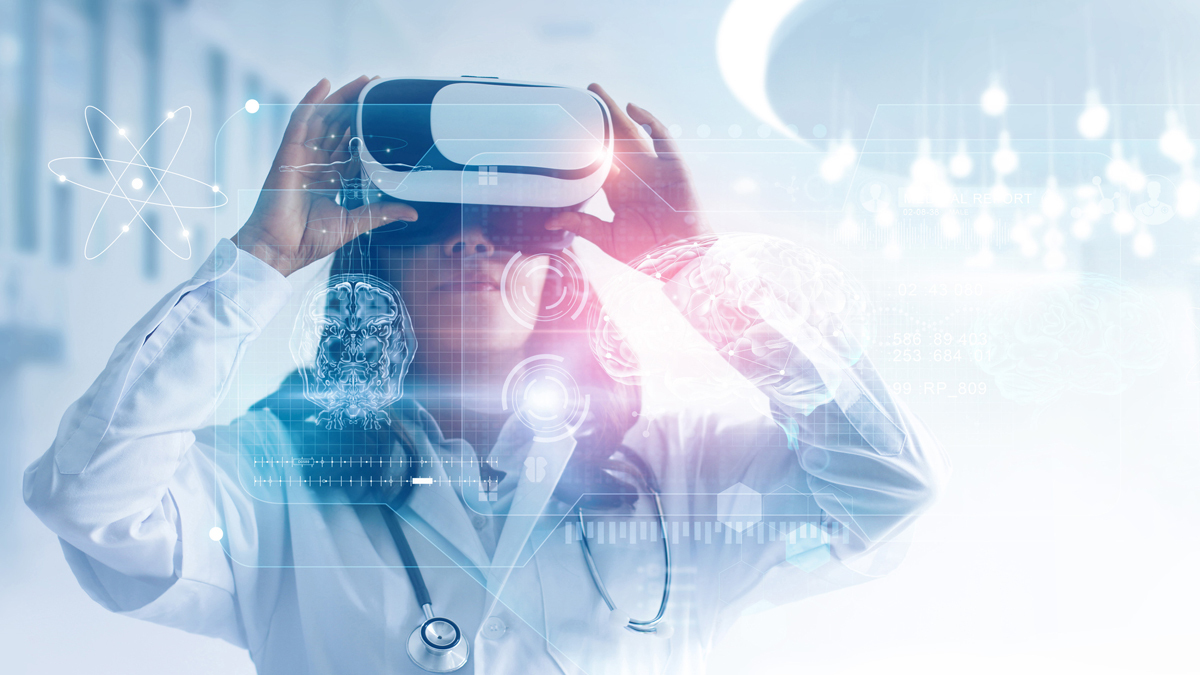A data company is cementing its place in medical XR

Rani Aravamudhan, MD, senior clinical consultant, and Jason Elliott, head of employer client experiences at Health Data & Management Solutions (HDMS), tell us how the company looks to leverage immersive technology and employ data to improve healthcare solutions.
At the International Virtual Reality Healthcare Association (IVRHA) conference in early March, Elliott and Aravamudhan relayed how HDMS looks to partner with medical extended reality (XR) companies, what data it offers those companies and its projections of XR's unique datasets.
As a CVS Health company, HDMS works with analytics, big data, and artificial intelligence and has clients that include providers, employers, health plans, brokers, consultants, and more.
It holds one of the most extensive data portfolios within the healthcare ecosystem, which Elliott and Aravamudhan say can help improve XR healthcare experiences' efficacy and, ultimately, patient outcomes.
Identifying XR/data use
It’s first important to know medical XR's use cases within the healthcare industry to properly evaluate how companies can effectively collaborate and employ the available datasets.
How providers may be harnessing medical XR in their practice will be different from how it will be deployed by a health plan or by an employer, who may be offering it as a wellness benefit to its employees.
"We're here to learn what [XR’s] diversity of use is and understand how we can partner with providers, health plans, developers, and researchers," says Elliott.
"We want to take the work that we do in the domain expertise that we have and help expand, consult, explain and collaborate to understand how the technologies they're developing and deploying in patient care will show up in the data we see," Elliott says.
As that information becomes more evident, Elliott says HDMS can then go back to its clients and explain medical XR's usage to create a virtuous feedback circuit to ensure the best use of the technology for all parties.
Regarding HDMS directly and its offerings, Dr Aravamudhan notes that some of the speakers at IVRHA relayed that the evidence gathered from medical XR's use is anecdotal. This is one way she says HDMS can help.
The types of datasets HDMS has on hand are broad and diverse and include medical claims, pharmacy claims, disability data, and many other standard data types.
"When it comes to XR, when you think about the kind of data that can be layered over [medical XR experiences and what those companies can gather] that makes it even richer," Dr Aravamudhan says.
By combining the plethora of data already available through data companies with the new type of medical XR data collected, researchers can attain a more precise picture of the patient's health.
"This is a new technology. It's a new market. We don't have a whole lot of people using it, but we may have other data for those same people. So, if we put that together, maybe it's not anecdotal anymore," Dr Aravamudhan states.
For example, say a study is done in the mental health space on medication use while simultaneously receiving medical XR treatment, and researchers conclude that a participant's medication use is slowly decreased.
Layering one's already-available patient data upon the data gathered through the study will provide a more accurate picture of the effects of the medical XR use within that study. Therefore, the results become less anecdotal and more tangible.
Alternatively, suppose the results show the XR experience did not affect the participant's medication intake. In that case, Dr Aravamudhan says they can go back to the XR company or content manufacturers and discuss how they can make their product, services, or adaptability better.
A new type of data
Using immersive technology as a new way to gather data is merely one example of how the healthcare ecosystem is progressively embracing technology to make change.
The traditional provider and patient relationship will remain a vital part of the healthcare experience. However, that relationship has begun to move more into the digital space through apps and other modalities.
"We see the XR evolution as the consequential next step in that progression," Elliott says.
HDMS has seen data migration move from traditional claims-based to more programme-specific, focusing on one disease state.
"We've worked so long in those more traditional datasets and needed to learn how to incorporate and analyse new datasets. Therefore, we're really well-positioned to understand the different types of data XR solutions will create," says Elliott.
"We can provide feedback to [XR companies] about the existing data environment, which is an extraordinarily rich ecosystem that they could easily use to extend what they are doing in their space."
Companies like HDMS can also gather new data types with the help of XR companies, such as eye-tracking data that wasn't previously readily available.
A vast amount of data can be collected via eye-tracking technology, including a user's biometric identity and drug consumption habits. Moreover, researchers can study an individual's visual attention patterns as they perform tasks and obtain insights into cognitive processes.
Several additional datasets can be gathered via eye-tracking, and as the technology progresses, new sets will continue to be discovered. In turn, more data can make it easier to detect patients who are potentially at higher risk for certain diseases.
Elliott says the data already collected by HDMS can help identify high-risk patients. Still, the data collected via immersive technologies will be valuable for the broader population.
"We're focused on the patient, but we're also focused on things that are doable and provable in their outcomes," Elliott says.
"We have this very rich data set, especially traditional data types, and we've been doing this for decades. As new data types come in, not only are we excited because we're data nerds, but also because we can help prove the hypotheses that the VR solutions are developing using our datasets and vice versa."
About the author
 Jessica Hagen is a freelance life sciences and health writer and project manager who has worked with VR health companies, fiction/nonfiction authors, nonprofit and for-profit organisations, and government entities.
Jessica Hagen is a freelance life sciences and health writer and project manager who has worked with VR health companies, fiction/nonfiction authors, nonprofit and for-profit organisations, and government entities.













